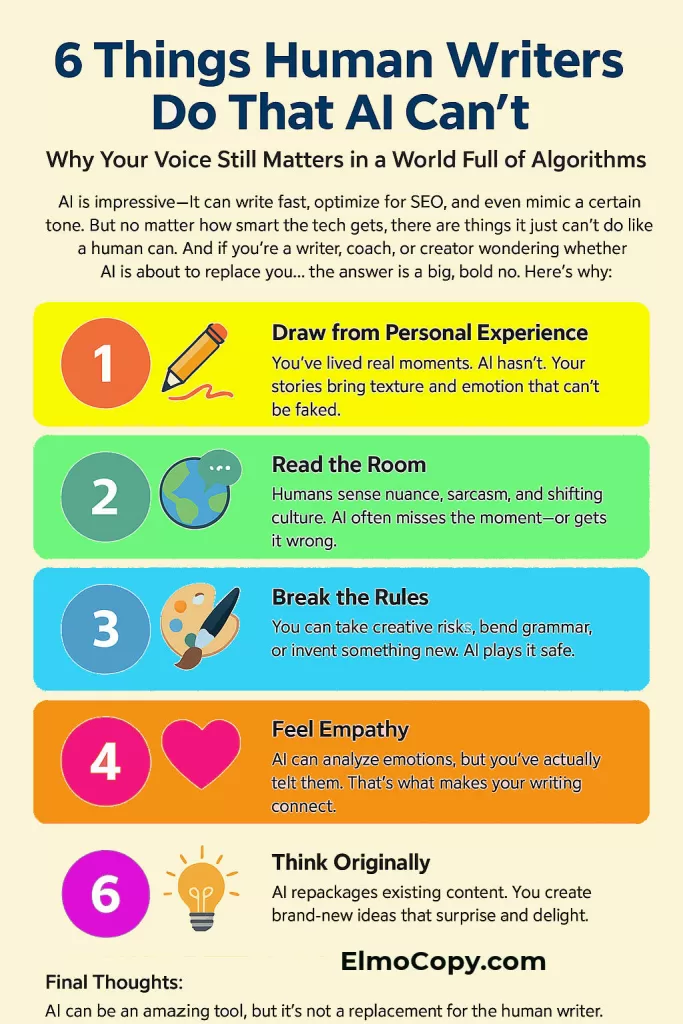So, you want to be an SEO copywriter?
Alright—but be warned…
You’re about to enter a world where you’re expected to appease Google and charm humans—with the same sentence.
It’s part sorcery, part science. Sure, you want your post to rank well—but you don’t want it to sound like a toaster wrote it.
The good news? You don’t have to sell your soul to the SEO gods to get results. You just need a little strategy, a little storytelling, and a dash of mischief.
Let’s dive into the dark (and weirdly fun) art of SEO copywriting.
So, what’s the problem?
Her clients rely on a so-called SEO content writing tool that forces her to jam in a bunch of keywords. (I won’t name names, but let’s just say they should call it “Pain in the Butt SEO Tool.”)
For writers, these platforms are a nightmare.
I know because I’ve also had clients who wanted me to use them. And honestly? They suck. You’d be better off letting AI take over.
The software spits out a list of keywords, and she has to cram them into her writing. Not only that, but it actually tracks how many times she uses them—like some kind of on-page SEO scorekeeper.
By the time she’s done, her writing sounds like a rusty, constipated robot.
(By the way, she refuses to write for businesses that use those kinds of SEO tools anymore. Good for her.)
But here’s the real problem:
How do you write posts that rank well in search engines without sounding robotic?
How do you create content that captures attention, sparks emotion, and still satisfies the SEO gods?
That’s exactly what we’re going to cover in this post.
So, let’s walk the tightrope of SEO copywriting and explore your options.

Mastering SEO Copywriting: How to Keep Your Creativity AND Google Happy
The Copywriter’s Tug-of-War
As a copywriter, you’re constantly juggling two competing goals. You want to write engaging, personality-filled content that hooks your audience, but you also need to satisfy the SEO gods so your work gets seen.
It’s a tricky balance. Lean too far into SEO, and your writing can feel stiff and robotic. Focus too much on creativity, and your beautifully crafted content might never reach the people who need it.
So, how do you strike the perfect balance? Let’s break it down.
The Struggle Is Real: Creativity vs. SEO
SEO and creativity don’t always play nice. On one hand, your writing should feel personal, original, and engaging—it’s your voice that makes your content stand out. On the other hand, search engines favor structure, keywords, and readability. If you want your content to rank, you need to play by their rules.
The problem is, if you write purely for SEO, your content loses its soul. It becomes a keyword-stuffed mess that bores readers to tears. But if you ignore SEO completely, your work won’t get discovered.
That’s where balance comes in. The good news? You don’t have to choose one or the other. You can have both.

Five Steps to Balance Creativity and SEO (Without Losing Your Mind)
-
Write for Humans First, Optimize Later
Before you even think about keywords, think about your audience. What are they struggling with? What questions do they need answered? How can you help?
SEO is just a tool—it’s there to get your content in front of the right people. But if your writing doesn’t connect with them, it won’t matter how well-optimized it is. Marketing expert Seth Godin once said he doesn’t worry about SEO. He just focuses on writing content that people love to read. And guess what? His blog is one of the most-read in the world.
The takeaway? Prioritize value. The rankings will follow.
-
Use Keywords Without Sounding Like a Robot
Keywords help search engines understand what your content is about, but they should never feel forced. Instead of stuffing them in awkwardly, weave them naturally into your writing. A good rule of thumb is to include your main keywords in the headline, subheadings, and the first 100 words. They should also appear in places like image alt text and meta descriptions.
Personally, I do my keyword research before I start writing so I have a general idea of what to include. But when I draft, I don’t stress about it. After my first couple of edits, I use a tool like Yoast SEO to check how many times my main keywords appear. Most of the time, I only have to tweak a few sentences—nothing major, and it never takes away from my voice.
-
Structure Your Content for Readability
Long, unbroken blocks of text? No thanks. Both search engines and real humans love well-structured content.
Breaking up your writing into short paragraphs makes it easier to scan. Using subheadings helps readers navigate your content. And adding lists where they make sense improves clarity. A well-organized post isn’t just better for SEO—it keeps your audience engaged.
-
Tell Stories, Not Just Facts
Let’s be real: no one wants to read dry, soulless writing. The best content makes readers feel something. Whether you’re sharing a personal experience, a case study, or a funny analogy, storytelling adds life to your writing. It keeps people reading—and the longer they stay on your page, the better your SEO.
-
Write Freely, Then Tweak for SEO (And Yes, Coffee Helps )
Here’s my process: First, I read up on my topic, take notes, and then write as if I’m explaining it to a friend. I don’t overthink structure or keywords—I just get the words out. Once I have a solid draft, I go back and refine it, making sure the content flows naturally and includes SEO elements where needed.
This way, my writing stays authentic and engaging, while still being optimized for search engines. And yes, coffee is a crucial part of the process.
SEO and creativity don’t have to be enemies. When you put your audience first and use SEO strategically, you can create content that’s both engaging and search-friendly. It’s all about finding that sweet spot—writing for humans while giving search engines what they need.
So, go ahead. Write something amazing. Optimize it just enough. And let your unique voice shine.
Understanding SEO Copywriting
SEO copywriting is all about creating content that both search engines and people love. It’s not just about stuffing in keywords—it’s about writing in a way that’s clear, engaging, and optimized for search. When done right, SEO copywriting helps websites rank higher while keeping readers interested.
Great SEO copywriting focuses on three things:
- Readability – Making content easy to read with short sentences, simple words, and clear formatting.
- Engagement – Keeping readers hooked with interesting stories, useful information, and a natural flow.
- Keyword Optimization – Using the right words in the right places so search engines can understand and rank the content.
SEO has changed a lot over the years. In the past, people used tricks like keyword stuffing, where they crammed as many search terms as possible into a page. But search engines got smarter. Now, they reward content that is useful, well-written, and focused on what readers actually want.
That’s why on-page SEO is about more than just keywords—it’s about writing content that answers real questions, provides value, and keeps people engaged. When you combine strong SEO content writing with smart optimization, you get the best of both worlds: better rankings and happy readers.
So, What Now?
If you’ve been relying too heavily on keywords and templates, you’re not alone. It’s easy to fall into that trap—especially when you’re trying to rank on Google and keep up with everything else in your business.
But here’s the truth most SEO “gurus” won’t tell you: It’s not enough to be found. You have to be remembered.
And the fastest way to be remembered?
Be human ,be real, and be yourself.
Let your writing show people who you are. Let it reflect your values, your voice, and the kind of experience your clients can expect from working with you. That’s the stuff that sticks.
When you blend smart SEO with authentic storytelling, you don’t just get traffic—you build trust.
And trust is what turns curious readers into loyal clients.

Want to Stand Out? Don’t Sound Like Everyone Else
You might be thinking, “Okay, but what about creativity? Does that even matter for SEO copywriting?”
It does—just not in the way you might expect.
Sure, search engines aren’t grading you on clever metaphors or a sparkling sense of humor. But your readers are real people—and they’re the ones who decide whether to trust you, follow you, and eventually buy from you.
And people love stories.
They always have.
Look at the entertainment industry—it runs on storytelling. No one’s binge-watching dull, keyword-stuffed shows (at least, not on purpose). Stories spark emotion. They make us care. And they’re just as powerful in marketing as they are in movies.
Don’t Let AI Replace You
It’s 2025, and AI is everywhere—powering the internet, shaping our tools, and changing the way we work. And here’s the thing: it’s only just getting started.
With tools like ChatGPT, the temptation is real. You might want to hand over all your writing to AI and call it a day. After all, it can sound natural enough.
But let’s be clear—it still isn’t you.
AI Can Only Take You So Far
Tools like ChatGPT can help with ideas, structure, and even SEO copywriting—but your unique voice? Your lived experiences? The personality that builds real connection? That’s all you.
There are certain things only human writers can do—and that’s exactly what makes your content stand out.

If you want your content to rise above the noise, lead with authenticity. Infuse your writing with personality and stories that connect. That’s how you turn words into relationships—and relationships into sales.
Put this where you’ll see it often:
My personality is my competitive edge.
The Role of Creativity in SEO Copywriting
Let’s be honest—nobody wakes up excited to read robotic, keyword-stuffed content. Not your audience. Not even Google (anymore). So if you’re treating SEO copywriting like a checklist of keywords and headers… it’s time for a mindset shift.
Here’s the deal: Creativity is not the opposite of SEO—it’s the secret ingredient.
Great SEO content isn’t just about being found. It’s about being remembered. That’s where you come in.
Why Creative, Compelling Content Matters
Your readers are real humans with real brains (and short attention spans). They’re not just scanning for keywords—they’re looking for something that resonates. Something that makes them think, “Hey, this person gets me.”
That’s what creative SEO copywriting does. It pulls people in, holds their attention, and builds trust.
Add a Dash of Storytelling
Think of storytelling as the garlic of copywriting—pretty much everything is better with it. A quick client story, a relatable metaphor, or a personal example can turn dry advice into something sticky and memorable.
You don’t have to write an epic novel. Just give your reader something real to connect with. A moment of “me too” can be more powerful than a perfectly optimized headline.
Let Your Brand Voice Shine
One of the best ways to stand out in a crowded online world? Sound like yourself.
Your voice is part of your brand—and your brand is what makes your content different from the other 7,452 posts on the same topic. Don’t be afraid to be funny, bold, quirky, heartfelt, or all of the above. If your audience feels like they’re hearing from a real person, they’re far more likely to stick around (and click).
Mini takeaway: SEO might get your content seen, but creativity is what makes it stick. And in the world of SEO for writers, that stickiness is gold.
Final Thoughts: SEO Copywriting Doesn’t Mean Selling Your Soul to Google
At the end of the day, SEO copywriting isn’t about stuffing your content with keywords or sounding like a robot from 2010. It’s about striking the perfect balance between being found and being felt.
Search engines may bring people to your page, but it’s your personality, your stories, and your voice that make them stick around.
So yes—use the tools. Optimize your headlines. Sprinkle in those keywords like seasoning.
But never forget: you are the secret sauce.
Keep writing with heart. Keep showing up as you.
And remember: the best SEO strategy in the world won’t matter if your words don’t make people feel something.
Conclusion
Any SEO copywriter can sprinkle in some keywords and call it a day.
But you? You’re here to do more than just rank.
You want to connect. Stand out. Say something real—and maybe even change a few lives along the way.
One thing’s for sure: you’re not here to sound like plain, vanilla, artificially intelligent yogurt. 🤖🥱
So yes—use the tools. Honor the algorithm. Keep an eye on those meta descriptions.
But never—never—trade in your voice just to appease the SEO gods.
Because at the end of the day, this is the only formula that matters:
S + S + P = P
Strategy + Storytelling + Personality = Performance (and people who actually give a damn).

